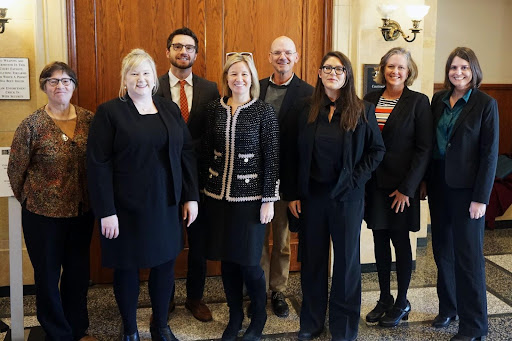Five things to know about PolyMet’s pending air pollution case

From left to right: MCEA staff Ann Cohen, Amelia Voss, Jay Eidsness, Kathryn Hoffman, Kevin Reuther, Heidi Guenther, Leigh Currie, and Joy Anderson at the Minnesota Court of Appeals for the PolyMet air pollution permit case this month.
Five things to know about PolyMet’s pending air pollution case
1. PolyMet’s air pollution permit was recently up for debate at the Minnesota Court of Appeals AGAIN. MCEA staff attorney, Jay Eidsness, presented oral argument to the three-judge panel on October 11. This was the third time the air permit has been at the Minnesota Court of Appeals, and the fifth time MCEA has argued about this permit in a state appellate court.
2. Our main argument throughout this five-year case has remained consistent: that PolyMet’s plan is to expand its mine beyond the levels allowed under the “synthetic minor” permit PolyMet obtained from the Minnesota Pollution Control Agency (MPCA). If PolyMet’s current intent is to expand its mining operation, as we believe it is, then the company should be required to secure a “major source” permit before opening to ensure the company makes the necessary investments on the front end to protect Minnesotans from the additional air pollution that would be created by operating a larger processing facility. PolyMet would prefer to start operating and then apply for a new permit when an expansion is imminent. But such a delay could allow the company to try and leverage economic considerations available under the law that could avoid it from having to install certain air-pollution capture technologies at that time.
3. There’s good reason and evidence to suggest PolyMet was dishonest about its expansion intentions during the permitting process. There is documentation that PolyMet told investors it was considering at least two scenarios where they would process more ore than their permit allows.
4. So what’s the decision before the court? State law requires MPCA to be assured that permit applicants have been truthful and not misleading during permitting. Our position is that there is credible evidence that PolyMet’s current intent is to expand to make more money, and that MPCA must investigate PolyMet’s expansion plans to determine whether the mining company has been fully above board about its intent during permitting. MPCA has maintained that it is not required to make changes to the permit nor investigate PolyMet’s present intent to expand, asserting instead that if PolyMet decides to get bigger it will be ordered to apply for a new permit at that time. The court is expected to issue its decision in the case by January 9, 2024.
5. Meanwhile, all of PolyMet’s other state and federally issued permits are either suspended or revoked, and MCEA and its allies will continue to work to vigorously ensure that any new proposed permits are carefully scrutinized to ensure they will protect Minnesota’s environment and the health of its people.